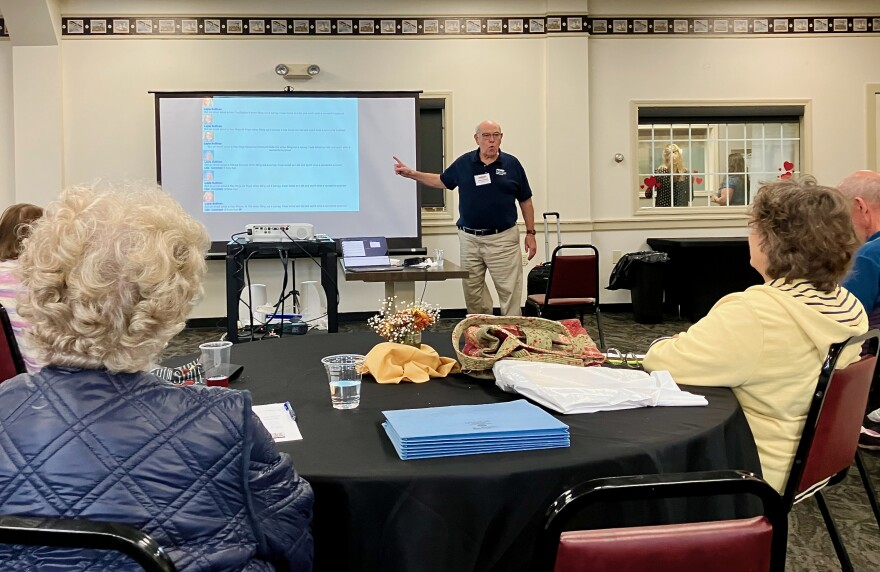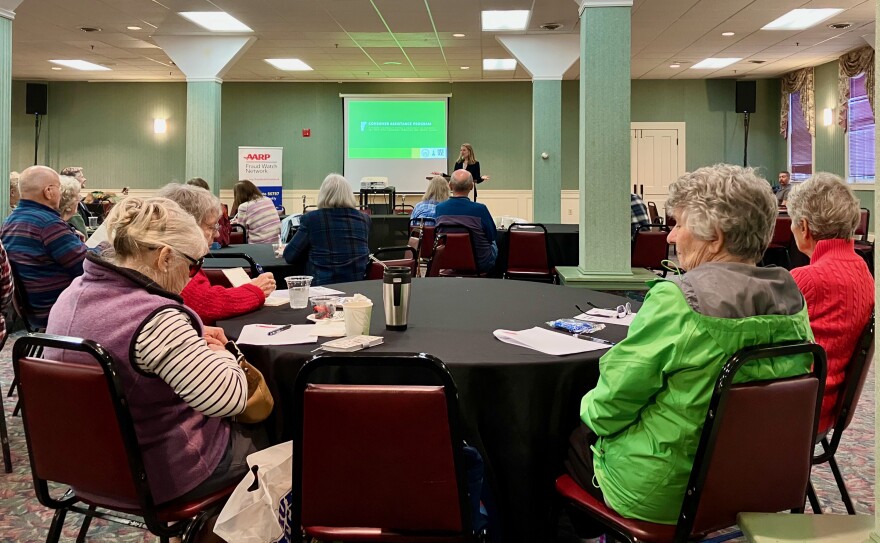Vermonters lost nearly $8 million to fraud last year, according to the Consumer Sentinel Network, an online database of consumer complaints maintained by the Federal Trade Commission.
Things like: identity theft, imposter scams, a Craigslist apartment that doesn't exist or a repair bill for work not completed.
While data shows more young people are victimized by fraud, older adults lose more money. It’s why AARP and other advocates say it’s so important seniors learn how to avoid being swindled.
Pat Zemianek is a retired teacher who lives in Bennington. She’s 82 and admits she’s still ashamed about something that happened last March.
“It is embarrassing, because I got an email from a friend. And this was a friend who did wonderful things for me. And she asked me for help,” Zemianek says.
But it wasn’t her friend, it was a scammer who included just enough information to seem real.
They asked Zemianek to send money in a prepaid gift card and she admits she got all the way to the post office before a postal clerk warned her of the danger.
She's still angry that she almost fell for it. “Because I was aware of those kind of scams, why didn’t I think of that immediately? But the emotions … I got caught up in the emotions.”
The way that we’re going to get a hold of this crime is by raising people’s understanding and education level of how these scams work and what we can do to prevent them.Greg Marchildon, director of the AARP Vermont chapter
Anita Duch is 74 and lives in Rutland Town. She's fed up by all the robo calls and emails claiming she won this or that. "I just delete them."
But fraud worries her, she admits. “I personally know someone who was scammed out of about $800 on one of those grandchild deals.”
Duch and Zemianek were among a small group of mostly older Vermonters at a recent scam busting seminar hosted by AARP in Rutland.
Greg Marchildon directs the senior advocacy group’s Vermont chapter. “The way that we’re going to get a hold of this crime is by raising people’s understanding and education level of how these scams work and what we can do to prevent them.”
While everyone is a target, Vermont Attorney General Charity Clark says seniors who are isolated, lonely or less tech savvy may be more vulnerable which is why she shared this rule of thumb.
“I should call it the red flag formula of 'This is a scam,'" Clark says. "Emotions are high, they’re trying to get your money, it’s urgent and you don’t know who they are.”
Fraud often follows disasters
According to the Consumer Sentinel Network, from 2020 to 2022, bogus charity scams nationwide doubled and home warranty frauds were up 127%.
"People are emotional after a disaster," Clark says, "and scammers see that as an opportunity. In the flood we experienced in Vermont in July specifically we saw an uptick in the utility disconnection scam."
More from Vermont Public: How to avoid scams during Vermont's disaster recovery
That was a scam where consumers got a call supposedly from their utility company saying their bill had not been paid and their electricity would be cut off.
“Well, if a flood has just occurred and you need to use a fan or a dehumidifier, you’re not going to ask questions," Clark explains, "you’re just going to say, 'I know I paid that bill but I’m just going to give you money so I can use the fan or dehumidifier.'"
AARP's Marchildon described a common repair scam which can be especially hard on older homeowners.
“'We’ll come fix your roof, we’ll come fix your driveway, we’ll take care of your porch. You give us a $3,000-$4,000 deposit and we’ll be back tomorrow to take care of the work.' They take your check, they take your cash and you never see them again,” Marchildon says.
So, how do you not get scammed?
First off, experts say don’t pay for work up front, and get contractor recommendations from trusted sources.
If you’re unsure whether a company or charity is legit, check with the Vermont Secretary of State’s office. A new law in Vermont requires residential contractors who perform construction valued at $10,000 or more to register with the state.
Vermont’s Consumer Assistance Program, a joint effort between the Attorney General’s Office and the University of Vermont, is another good resource if you have questions about fraud or want to report it.

Because many criminals target seniors online, Elliot Greenblott, AARP Vermont’s fraud watch coordinator, has several tips.
Number one, be wary of free WiFi in public places. "For instance, don’t take care of online financial business at a Starbucks or in a hotel lobby," he says.
"And don’t respond to alerts," he adds, shaking his head, "You get an alert and it says you need to act now, don’t do it.”
If you’re unsure about an email, look closely at the details of who’s sending it. Watch for misspellings and poor grammar. And he stresses, "Don’t click on any attachments, even unsubscribe buttons."
Blocking unknown callers on your cell phone is also not recommended.
“All you’re doing is saying, 'Hey, I’m here.' It’s like when you get that phone call and it says press two to be taken off our list," continues Greenblott. "Don’t press two, that’s just confirming your existence.”
For instance, don’t take care of online financial business at a Starbucks or in a hotel lobby.Elliot Greenblott, AARP Vermont’s fraud watch coordinator
To avoid the dreaded grandchild scam, where criminals call and pretend to be a loved one who’s in trouble and needs money, families should have a plan and a safe word or phrase they can use when someone really is in trouble.
This is even more important now that criminals are using artificial intelligence to replicate voices.
Crystal Baldwin of the Vermont Attorney General’s Consumer Assistance Program says because fraud is so common, it's not a question of if you'll get scammed, but when. So she says everyone should have a trusted person they can call when something just feels off.
“Whether it’s an online purchase we’re thinking of making or a phone call in the middle of the night. Just having that extra person to rely on can make all the difference in stopping scams together,” Baldwin says.
And Baldwin and others say if you do get duped, don’t wait to report it. A wire or electronic funds transfer can be stopped within 72 hours, which means it may be possible to get your money back if you act quickly.
Mostly, experts say listen to your gut. If someone calls you on the phone or emails you with a deal that sounds too good to be true, it probably is.
Have questions, comments or tips? Send us a message.





